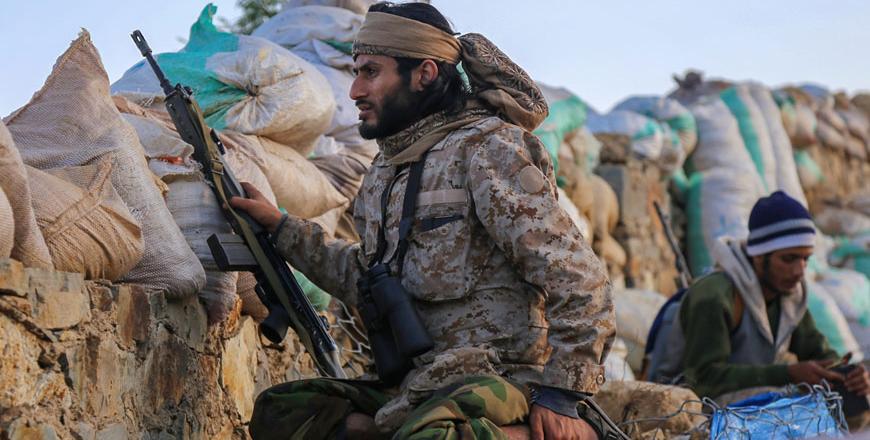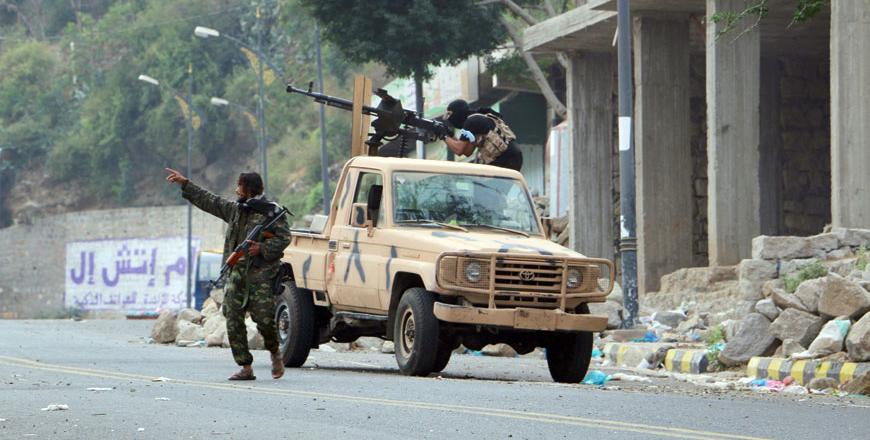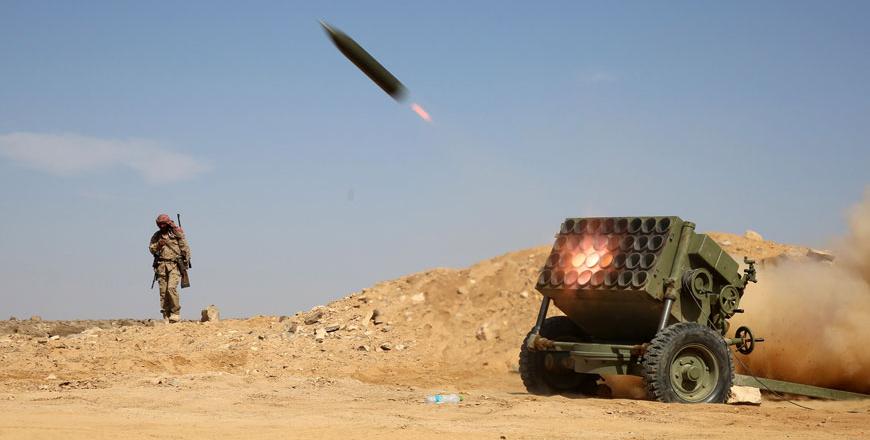You are here
Yemen warring parties in prisoner swap amid shaky truce
By AFP - Dec 16,2015 - Last updated at Dec 16,2015

Yemeni tribesmen from the Popular Resistance Committees, supporting forces loyal to Yemen’s Saudi-backed President Abed Rabbo Mansour Hadi, hold a position in the country’s third city Taez, on Wednesday (AFP photo)
ADEN — Pro-government forces and Iran-backed rebels in Yemen began exchanging hundreds of prisoners on Wednesday on day two of UN-brokered talks in Switzerland and as a fragile ceasefire appeared to hold.
Some 375 Houthi rebels and 285 pro-government fighters are expected to be involved in the swap which began "in small groups" according to Mokhtar Al Rabbash, a member of the pro-government prisoners' affairs committee.
The exchange is taking place along the boundary between the southern province of Lahj and the central province of Baida, witnesses said.
"Due to the security situation, we had to divide the prisoners into groups of 20 each," said Rabbash, adding that the detainees were being transferred in buses.
Military sources in the area warned that security threats along the exchange route could slow the process.
The International Committee of the Red Cross in Sanaa, which was involved in a previous prisoner swap, said earlier the organisation was "not aware of such an exchange".
Although the fighting in Yemen has subsided, both sides traded blame for violations that have left at least 24 people dead since the truce began at midday (0900 GMT) on Tuesday.
The Saudi-led coalition supporting embattled President Abed Rabbo Mansour Hadi accused the Houthi Shiite rebels of flouting the ceasefire from its very first hours, and acknowledged that it had "responded to these violations".
The rebels, meanwhile, accused the coalition of breaking the truce immediately after it began by carrying out "a series of raids on various provinces".
This mutual animosity underscored the challenge facing delegates at the talks which began in Switzerland on Tuesday.
Previous ceasefires have collapsed, and earlier UN efforts have failed to narrow differences between the warring parties.
The UN envoy to Yemen, Ismail Ould Cheikh Ahmed, has called the truce "a critical first step towards building a lasting peace in the country".
A spokesman for the coalition, Saudi Brigadier General Ahmed Al Assiri, said that the alliance's leadership "realises that this is an important and crucial phase to find a peaceful solution, but has a military commitment to respond to violations".
Saudi soldier killed
The coalition launched an air war against the rebels in March after they forced Hadi to flee the country, and has also sent in ground troops.
On Wednesday, military sources reported mortar and gunfire by rebels in several parts of the besieged provincial capital of Taez.
Pro-Hadi forces also attacked rebel positions in the city, a military source said, and fighting was also reported in Marib province east of the capital.
The coalition also said a Saudi soldier was killed "while protecting the kingdom's borders from aggressing rebels" in the kingdom's southwestern Najran area, SPA state news agency reported.
On Tuesday, just hours after the truce came into effect, rebel artillery and tanks killed seven civilians and wounded 15 in Taez, witnesses and medics said.
Rebels also killed 17 loyalist fighters and wounded 20 in Marib, a military source said.
Hadi has said he wants a seven-day truce to coincide with the peace talks to be "renewed automatically if the other party commits to it", the coalition said.
Little news has emerged from the open-ended talks in Switzerland.
UN spokesman Ahmad Fawzi told reporters on Tuesday that 12 negotiators and six advisers made up each of the two delegations attending the talks.
"These consultations seek to establish a permanent and comprehensive ceasefire, secure improvements to the humanitarian situation and a return to a peaceful and orderly political transition," he said.
A ceasefire is much-needed in the Arabian Peninsula's poorest nation, where the UN says an estimated 80 per cent of the population requires humanitarian aid.
The World Health Organisation representative in Yemen, Ahmed Shadoul, said the agency had received assurances that it was free to distribute medical supplies while the truce holds.
More than 5,800 people have been killed in Yemen — about half of them civilians — and more than 27,000 wounded since March, according to the UN.
Related Articles
ADEN — Several attacks rocked a fragile ceasefire in Yemen Tuesday as the warring sides began UN-brokered peace talks in Switzerland, milita
GENEVA — Negotiators taking part in Yemen peace talks in Switzerland agreed Saturday to create a "neutral" committee to monitor the country'
RIYADH — Saudi Arabia is waiting for "serious steps" from Yemen's rebels on a potential prisoner swap before responding to their offer of a













